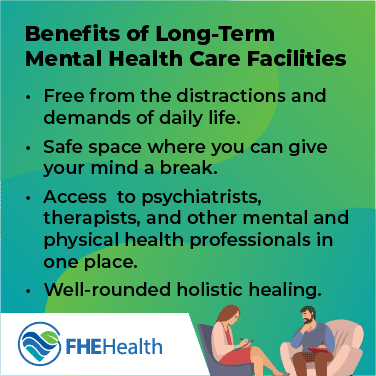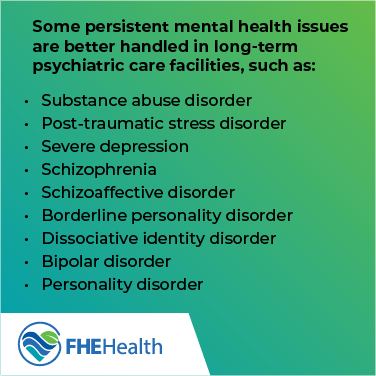

Mental health is an important but often neglected aspect of life. Over 20% of Americans live with a mental illness, and many may need to stay at long-term mental health facilities.
Unfortunately, there’s a lot of stigma around live-in, long-term mental health facilities. Dispelling the fear and ignorance of permanent mental hospitals is important. Read on to find out what long-term mental health care is and what happens in long-term mental health facilities.
Does the term “long-term mental health care” bring to mind 19th-century mental asylums with rusty metallic beds and chains? That unfortunate stereotype couldn’t be further from reality.
Long-term mental health care refers to the services provided at live-in mental health facilities. People may stay in a long-term psychiatric hospital for six months or more to receive continued therapy and mental support. The duration of stay depends on their mental state and their progress toward mental and general well-being.
Long-term mental health care goes beyond medication. At FHE, patients work with a qualified team of professionals who personalize the therapy interventions used and track their progress over time. They undertake various therapies at a reasonable pace, slowly developing coping mechanisms they can use once out of the facility.

Short-term stays at a mental health facility are often useful in mitigating emergencies, including scenarios where you’re a threat to yourself or others. The stays give your mind a break and help you stabilize your thoughts, feelings, and behavior.
However, short-term care may not give you enough time to explore your trauma and develop adequate coping mechanisms. Once you’re back out in the world, you may be unable to properly identify your triggers and deal with them in a healthy way.
Long-term mental health facilities take you away from the distractions and demands of daily life. They provide you with a safe space where you can give your mind a break and actively work on bettering your mental health.
Another advantage of long-term mental health care is the team of professionals who work with you. You can access psychiatrists, therapists, and other mental and physical health professionals in one place. They evaluate your personal history, including mental health conditions and diagnosis, before charting a path to wellness.
Long-term mental health care facilities are well-rounded to ensure holistic healing. We use cognitive behavioral therapy (CBT) and dialectical behavioral therapy (DBT) at FHE.
We also use massage, acupuncture, breathwork, yoga, expressive arts, and music therapies. The goal of such treatments is to help you build coping mechanisms that you can implement on your own when you encounter real-life triggers.
Through group therapy and recreational therapies, long-term mental health care lets you build a community of people who are on a journey similar to yours. These people form a supportive social system that helps you maintain healthy habits even after you leave the facility.
Treatment can begin quickly and discreetly, get started now
The costs of staying at a reputable long-term psychiatric hospital are a big concern for many people. Fortunately, several avenues help make such care affordable.
Private insurance that you pay yourself or that an employer pays for may be the easiest option for most people. You can check with your insurer to confirm what lengths of stay the policy covers. Our website also has resources for different insurers that can help you make a more informed decision.
Additionally, you might be eligible for long-term care under Medicaid if you’re under 21 or over 65 years old.
People between 21 and 65 may qualify for long-term care under their state’s mental health program. The SAMHSA Directory provides each state’s updated list of mental health providers, making it easier to find the right long-term mental health facility for you.
Nobody wants to lose control over their day-to-day lives. However, letting your mental health deteriorate to a point where family members admit you to a facility, or a court orders long-term care, is worse.
Taking control over your mental health care is the first step to ensuring continued autonomy. If you enroll in a facility, you can leave whenever you want, even if the care team doesn’t suggest such a move.
Facilities have different procedures for discharging patients before the treatment period expires. Do your research and ask the administration about its policies before enrolling in a facility. This lets you know what to expect and goes a long way in making you more receptive to the care provided.
You might worry that once you agree to live in a long-term mental health facility, you’ll be locked up like a prisoner. However, as long as you don’t pose a risk to yourself or others, you’ll have a lot of independence.
When receiving inpatient mental health care, you get a schedule outlining the different activities for each day. These schedules help you remain committed to your mental care journey.
However, you’re not restricted from socializing, relaxing, and pursuing hobbies. You can freely watch TV, take walks, and play games with other residents.
We offer 100% confidential and individualized treatment

Long-term mental health care is very effective at helping individuals with persistent mental health issues build mechanisms for better functioning.
Some conditions better handled in long-term psychiatric care facilities include:
Such conditions can disrupt your daily routine and put you in danger of harming yourself or others.
Long-term care in a psychiatric center helps you work through the symptoms and put the coping mechanisms you develop into extensive practice. By the time you’re ready to leave the facility, you’ll be able to deal with the issues in a healthy way that won’t cause further trauma.
Mental health conditions go beyond hurting you to harming your family and friends. Long-term care gives all affected parties time to work through anger, distrust, and disappointment before reuniting. You and your loved ones can find the way to forgiveness, acceptance, and support at your own pace without the pressure of forced interactions.

The signs of mental illness occur for some time and disrupt your usual way of life. If you know what to look for, you can get help before you deteriorate further.
Here are some signs that you need mental health care:
Ready to start? More questions about treatment?
FHE Health provides dozens of people with different levels of care for their mental health. Our live-in mental health facilities are located on a five-acre campus, providing a conducive environment for mental health progress. FHE professionals are always ready to walk with you on the journey back to a healthy mental state. You can call us anytime at (833) 596-3502 to speak to a counselor about staying at our long-term mental health care facilities.
Chris Foy is a content manager and webmaster for FHE Health with years of experience in the addiction treatment industry. read more